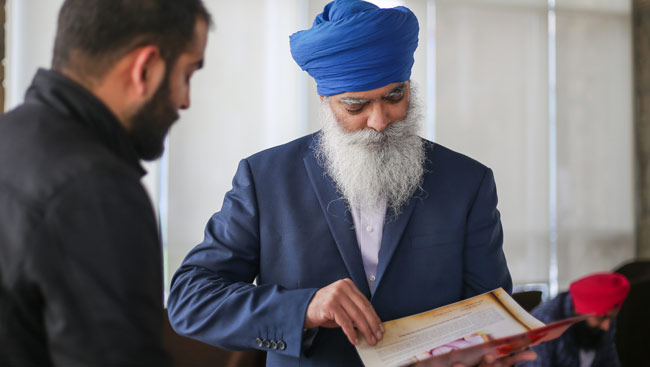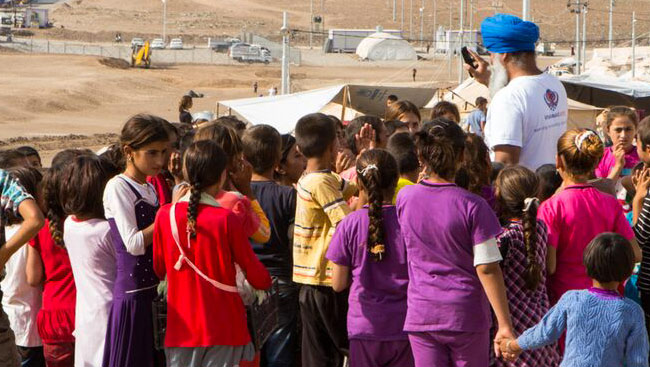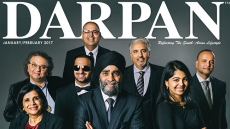In today’s intolerant world where judgements are made based on one’s race, religion and beliefs, the crucial need of the hour is the promotion of love and revivement of our faith in mankind. Though this change in attitude cannot happen overnight, even simple acts of kindness can go a long way in attaining a world that believes in equality and charity.
Ravi Singh, founder and CEO of Khalsa Aid, an international non-profit aid and relief organization, has taken it upon himself to achieve this world vision. Through Khalsa Aid, he has been reaching out to various corners of the earth helping those in need and in turn rekindling people’s trust in humanity.
The idea of taking the concept of langar aka Sikh community kitchen to people or regions that needed it the most gave birth to Khalsa Aid organization in 1999 in London, United Kingdom. Singh recalls the moment vividly as it was the during that time that a vicious civil war was taking place in Kosovo, a disputed territory and partially recognized state in Southeast Europe. Thousands of Kosovo residents, who fled the war zone to take refuge in neighbouring states, were homeless and without basic necessities such as food and water.
“In April 1999 so many refugees in the border were fighting for a piece of bread. That year Sikhs were celebrating 200 years of the Khalsa as an identity,” adds Singh who began questioning himself and the community on the concept of langar and its purpose. The fact that there wasn’t any method of taking langar to where it is needed most disturbed him immensely. “Each gurudwara has four doors which means anybody from four corners of the world can eat in the gurudwara. So why haven’t we gone out into the four corners to those who can’t reach us?” he wondered. This triggered in Singh the need to take the real meaning of langar to where it is required – to reach out to those who had no access to it. This materialized with the formation of Khalsa Aid.
Today, Khalsa Aid is globally known as an international NGO with the aim to provide humanitarian aid in disaster areas and civil conflict zones around the world. The organization is based upon the Sikh principle to ‘Recognise the whole human race as one’.
Sharing the origin of the name, Singh says that it was chosen because the word ‘Khalsa’ is driven by humanity. “That we don’t hate or judge any faith; we respect and get along with everyone.” Starting with the first mission in Kosovo, Khalsa Aid has worked in war-hit zones like Syria and Yemen; helped multiple countries struck with disaster like the Nepal earthquake, famine in Kenya, and Indonesia Tsunami; and aided refugee camps in Greece, Lebanon and Congo, among many others. “We have attended almost every disaster. We don’t do just bits and pieces. [With] each operation we are spending more, learning more, and utilizing local groups,” says Singh proudly.
In India, Khalsa Aid has played a prominent role in providing relief to various areas hit by natural calamities like the Vishakhapatnam cyclone, floods in Jammu and Kashmir, and Gujarat earthquake, among others. “Over the last three to four years, we have developed a fantastic team in India,” says Singh.
Though Khalsa Aid is a small organization, with the backing of a large group of volunteers and generous donors, it has organized aid missions all over the world. Singh provides a basic idea on how the missions work: Each mission comprises of a volunteer group or aid workers who undergo risk assessments to ensure they are safe when they are travelling. The organization gets access to local contacts like churches or mosques to get a clearer idea on language, cultures and sensitivities of the region. “Once in the country, the team spends days or months working with the local groups to make sure that what they do is effective. We share our experiences on aid work to enhance it.”
Funding comes mainly from the Sikh community; Khalsa Aid does not receive any government funding. “About 98 percent is funded by the Sikh community from around the world. If it is a major disaster, then the gurudwaras step forward as well,” says Singh, adding that the organization has had a lot of non-Sikh supporters from UK in the past couple of years.
Khalsa Aid does not work with larger organizations for two main reasons – one, to keep away from corruption, and two, to avoid disrupting the economy of the country they are helping. Corruption apparently is existent even when one is selflessly helping those in need. “I have seen in the last 18 years how corruption works in these countries. We work with a Rotary Club, a Lion’s Club, mosque, church, or temple because you get a lot of volunteers at grassroots levels who have the passion of serving the people but don’t have funding. So we provide the funding, they provide the knowledge on the crisis, and we work together,” explains Singh.
Elaborating on the second reason, he says that when a disaster happens, many countries and large aid agencies use the local services like hiring trucks without negotiating. “This ruins the local economy as the local businesses that need the services can’t afford it. I don’t believe in that, I believe that when we work with local organizations, churches or Rotary Clubs, we get the best discounted prices and we don’t affect the local economy.”
Besides corruption, Singh points out that hindrance from authorities while organizing the charity missions is also quite common. Surprisingly, the Indian-origin CEO says “the biggest obstacle we have or the most harassment we get is in India. Our office in India is continuously under watch by the intelligent services and the police.” In fact, he reveals that Iraq is so far the best country he has worked in. “The Kurdish regional government never harass us. We have several check points and armed police everywhere yet we don’t get harassed, we are welcomed.”
His biggest obstacle? “The most difficult issue which we still face is mistaken identity,” declares Singh, recalling an incident that took place in Congo in 2003 post the 9/11 US attacks. A Christian village wouldn’t let the team help them assuming they belonged to a terrorist group. “We said number one, we are here to help, and number two, we have nothing to do with the Middle East,” adds the Sikh charity worker, who is cautious when working in Middle Eastern countries. “Most locals will look at you and would want to know who you are; our fear is the foreign forces as the western forces in the country might think we are ISIS. So we [are] always careful in the way we act in these countries.”
Singh believes that mistaken identity, especially due to the turban, even today is playing a very negative role towards the Sikh community. He specifically mentions his experiences at airport security when travelling to various countries. “If I am going to Iraq, I am more fearful and nervous being at the airport than in Iraq. When we work aboard we are okay but when we are going through the airports, we feel that we are targeted,” expresses Singh, calling it the worst part of the job.
The solution to get rid of this perception, he says, is by educating people and raising awareness. “The only way to deal with it is to educate and the better you can educate, it will be more [aid] work around the world. To be more visible, reach out to people even if they have never heard of you and do your work. I think we should keep carrying on being a humanitarian.”
For Singh and his team, every mission is a learning experience to become better. Even though he has been to some of the most dangerous and life-threatening regions, the response he has received from people in return has been worth the risk. “The most positive thing is that it changes you for the better. You can’t get more fulfilment in life than in helping others. When you or anybody becomes a symbol of hope for people, then you have achieved your goal because materialism can’t get you the love and respect from other people. So much warmth that you get from people you are helping, you can’t get that anywhere. You can’t buy it,” says the good Samaritan.
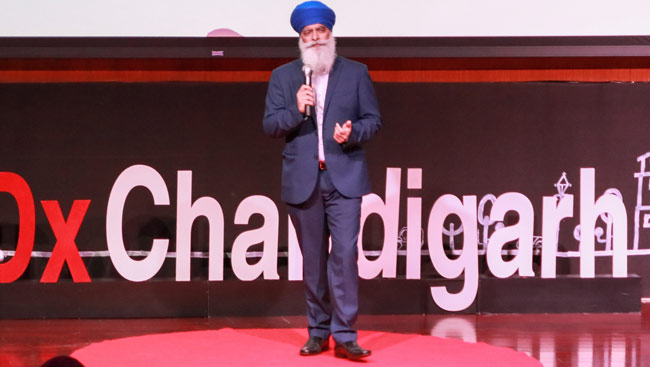
Through his work and actions, Singh has become a symbol of hope and humanity for people who are gravely affected and broken. He narrates a touching incident that happened a few months ago in Iraq: “One of our lady coordinators from Iraq called and said that a woman, who was being held hostage with her husband and children by ISIS, has come back. One of our team members helped her with food and other necessities. Two days later, the coordinator called and said that she just found out that the day we helped the woman, that night she was going to kill herself with her children because she was so broke and nobody helped her.”
He recounts another one of his experiences helping out in a town in Bosnia during the floods in 2014. “Members of the town would cook for us, they would ask us to eat with them and there was so much love,” says Singh who fondly remembers his relationship with an elder who treated him like his son. “He said you are always invited to my house. I will never forget that man. The whole town of Bosnia was so loving. Each mission, we leave behind good friends, we leave pieces of our heart behind.”
Positive episodes such as these have encouraged Singh and his team to keep going and be advocates for humanity. “You change lives by reaching out. People like me, we have seen a lot of destruction, and you never lose hope in humanity. You always help people and never give up. We never stop believing in humanity because then you spread more love in the world. It makes you driven to do more,” he emphasizes.
I ask him how he gets the courage to visit these dangerous areas and selflessly help the people in need, and Singh confidently answers that the motivating factor is his faith and identity. “Courage comes from my faith and my faith drives me to work without implementing or putting conditions on me. We are told that we are here not for ourselves but for our humanity,” asserts Singh who is deeply moved by the values his Sikh faith has taught him. “The message we have from the gurus is Sarbat Da Bhala – well-being of all. Sikhs are always praying for the well-being of the whole world, not just Sikhs. Also Vand Ke Chakna – which means share what you have. This is what we are, we are here to help and the major contribution is your faith.” Furthermore, his vision for the world has given him the courage to keep going. “When you have a vision, you automatically create your own courage because no matter what happens you have blinkers on and you are focussed on one thing. You are establishing that vision and you don’t care what happens to you,” affirms Singh.
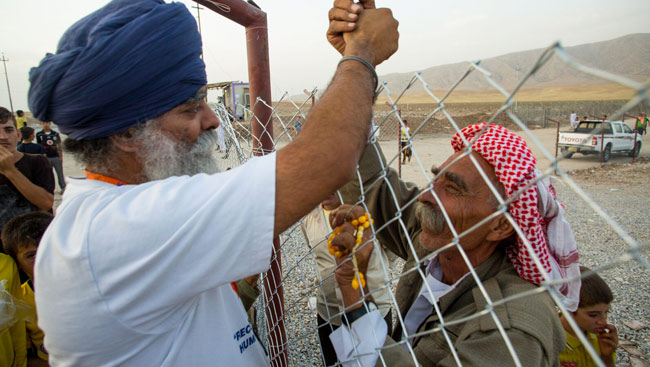
But does he not get affected by all the suffering he sees during these missions? “It does affect you but it makes you stronger that you want to do more,” answers Singh, who does experience sleepless nights the first couple of days he is back home. “When you see suffering, it rips your heart out. It motivates you to do more for them; to tell them that they can trust you. Anything that you witness makes you more human, keeps you in check and tells your brain why you are doing it and inspires people like me to do more.”
At present, Khalsa Aid is carrying out multiple projects simultaneously around the world. The operation in Turkey for the Syrian refugees is ongoing since last year. The nine operations in Haiti during the earthquake in 2010 are still on. Khalsa Aid is helping with educational needs for refugee children in Lebanon. The organization has provided water pumps and water sanitization programs in Malawi and is installing water pumps in rural Malawi which is one of the poorest countries in the world. “Our biggest projects are in Punjab. We are looking after 250 families who are in deep poverty; we support them every month with welfare pensions. We are running two free schools for the underprivileged in Punjab; we have got four free tuition centres in different parts of Punjab for those students who are bright but can’t afford education. We have a medical program in Punjab where we are funding emergency medical care/ operations for those who are in poverty,” says Singh.
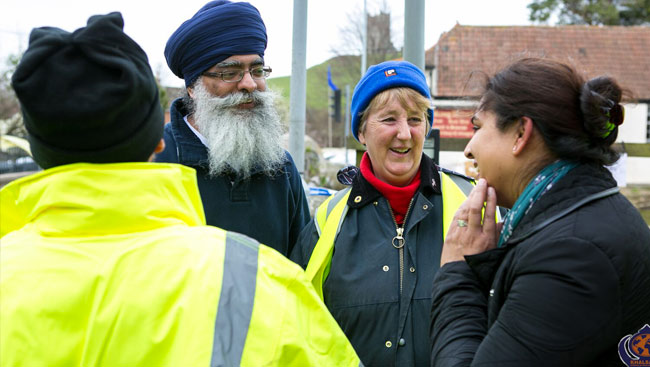
Word is spreading fast on Singh’s courageous acts and the many initiatives of Khalsa Aid. “Life has changed because it is a complete turn around from normal life. It is 24/7; we have people calling from all around the world day and night,” says Singh who jokes that his beard has turned completely white with the change. In 2016, BBC made a documentary around Singh’s work in Northern Iraq titled The Selfless Sikh: Faith on the Frontlines. The film follows Singh’s journey as he provides aid to Yazidi families who have fled their homes to escape the brutality of Islamic State. “The work continues and has been going on since 2014 when I first went to Iraq. It is something that was a challenge in the beginning because we were working at about 20-30 kilometres from a live battle going on in Mosul – headquarters of ISIS in Iraq. The risks and attacks we heard were real. It is one of the most important projects we are doing at the moment,” says Singh about his relief work in Iraq.
Besides positive media support and promotion, Singh is elated about the huge volume of volunteer emails Khalsa Aid gets each day. “The greatest achievement for myself is that we got a whole young generation who grew up watching the work of Khalsa Aid and most of them want to get involved helping people around the world. It is amazing that they want to share the love and they want to do that without judging or any prejudice against race or colour or faith.”
In the next five years, Khalsa Aid aims to develop a larger team of staff and train more individuals and aid workers to do more operations. “Especially longer terms operations in development and education in places like Africa and Asia. What I would like to do in India is health clinics for women and children so that women have the most basic health care. And in Africa, sanitization and water.”
Khalsa Aid will be setting up a registered organization in Canada and America soon. “We have more than 400 volunteers from all over the country. Khalsa Aid has reached many hearts of non-Sikhs. Our growth continues but there is much more we can do. Our growth won’t be just based on monetary funds but will come from many more projects we do in the coming years,” says Singh humbly.
In conclusion the selfless Sikh wants “people to follow in the footpath of Khalsa Aid so that we build something around the world and give something to the next generation. Build bridges not walls, reach out without having any issues on faith, race or religion and be the humanitarian we are meant to be.”
